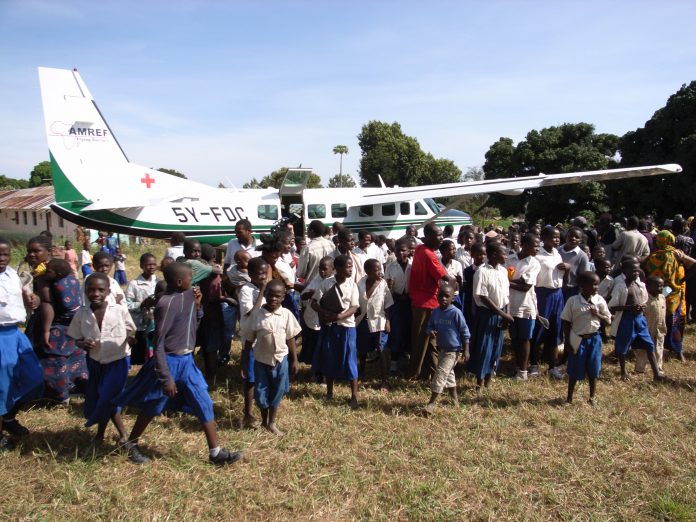When armed gunmen on March 23 opened fire on worshippers in a church just outside the port city of Mombasa, Kenya, killing six at last count, they left behind a toddler with a bullet lodged in his head.
The specialized attention one-and-a-half-year-old Cyprian Osinya needed was available only at Kenyatta National Hospital, some 274 miles away in Nairobi, Kenya’s capital.
Two days after the attack onthe church, AMREF Flying Doctors, an air ambulance service launched in 1957 by three surgeons in the foothills of Mt. Kilimanjaro, Kenya, evacuated Osinya to Nairobi from Coast General Hospital in Mombasa.
Distance, says Peter Ngatia, the visionary director of capacity building at the African Medical and Research Foundation, or AMREF, is one of the three biggest challenges facing Africa’s health system.
“The health facilities are so far away. For every five kilometers (3.1 miles) radius there should be a health facility. In Africa, it’s 20 kilometers radius; if you’re lucky, 10 kilometers radius,” Ngatia said.
Another major challenge is lack of leadership management of the health system.
“Everybody has assumed over the years that because ‘Peter’ is a good doctor he is therefore the right person to go and head the ministry of health; he is the right person to go and lead the national hospital. But ‘Peter’ doesn’t even know how to make policies. He doesn’t know how to read policies and he’s not very interested because he has specialized in cardio-thoracic surgery,” Ngatia explains. “You go to African ministries of health and the top man would be one of the high-level specialists, but they are sitting there signing checks.”
The primary challenge, however, is the shortage of health workers. Africa today has a shortage of about 800,000 health workers, a number needed between now and 2015.
“Africa bears the heaviest burden of disease. About 24 percent of the world’s disease burden is borne by Africa. Yet, Africa only has about 3 percent of the world’s human resource, or health workers, population. [It] has only 1 percent of all the funding for health in the world,” Ngatia said. “Putting all that together, it makes the African health system a very, very fragile health system from all angles.”
Ngatia delved deeper into these challenges in a recent interview in New York with AfricaStrictlyBusiness.com, describing AMREF’s transformational response to them using exclusively designed mobile, e-learning, and telemedicine platforms, a one-of-a-kind MBA in health, and an internally built network that links universities, medical schools and schools of public health across Africa.
“AMREF has recognized that ICT is the tool of our times to deliver health…Our innovation has always looked at what it is that we can use to deliver health effectively to the communities, from the Flying Doctors to where we are today,” he said.
A 25-year AMREF veteran with a Ph.D in medical education, planning and development from the University of Alberta, Canada, Ngatia is based at AMREF headquarters in Nairobi. At the time of his interview with AfricaStrictlyBusiness.com, he was visiting the United States for meetings with the organization’s international board and U.S. corporate and academic partners. Read the entire interview here.













